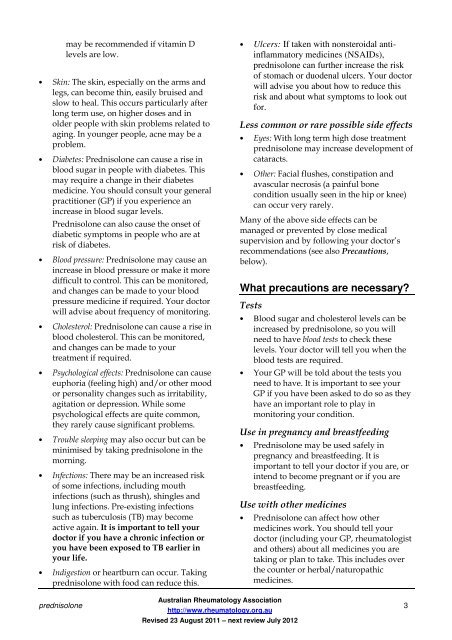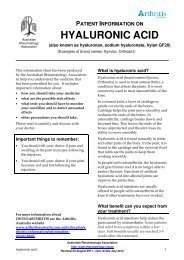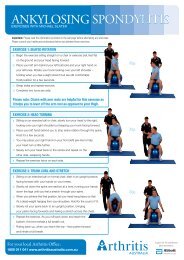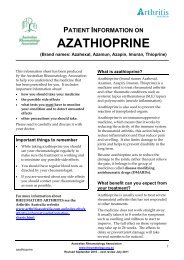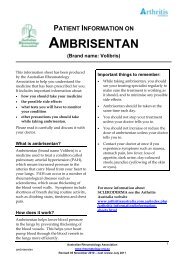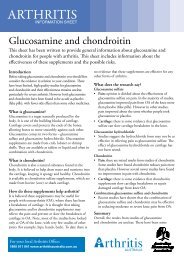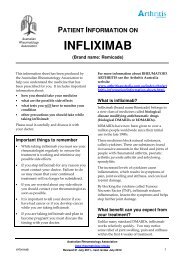PREDNISOLONE & PREDNISONE
PREDNISOLONE & PREDNISONE
PREDNISOLONE & PREDNISONE
- No tags were found...
You also want an ePaper? Increase the reach of your titles
YUMPU automatically turns print PDFs into web optimized ePapers that Google loves.
may be recommended if vitamin Dlevels are low.• Skin: The skin, especially on the arms andlegs, can become thin, easily bruised andslow to heal. This occurs particularly afterlong term use, on higher doses and inolder people with skin problems related toaging. In younger people, acne may be aproblem.• Diabetes: Prednisolone can cause a rise inblood sugar in people with diabetes. Thismay require a change in their diabetesmedicine. You should consult your generalpractitioner (GP) if you experience anincrease in blood sugar levels.Prednisolone can also cause the onset ofdiabetic symptoms in people who are atrisk of diabetes.• Blood pressure: Prednisolone may cause anincrease in blood pressure or make it moredifficult to control. This can be monitored,and changes can be made to your bloodpressure medicine if required. Your doctorwill advise about frequency of monitoring.• Cholesterol: Prednisolone can cause a rise inblood cholesterol. This can be monitored,and changes can be made to yourtreatment if required.• Psychological effects: Prednisolone can causeeuphoria (feeling high) and/or other moodor personality changes such as irritability,agitation or depression. While somepsychological effects are quite common,they rarely cause significant problems.• Trouble sleeping may also occur but can beminimised by taking prednisolone in themorning.• Infections: There may be an increased riskof some infections, including mouthinfections (such as thrush), shingles andlung infections. Pre-existing infectionssuch as tuberculosis (TB) may becomeactive again. It is important to tell yourdoctor if you have a chronic infection oryou have been exposed to TB earlier inyour life.• Indigestion or heartburn can occur. Takingprednisolone with food can reduce this.• Ulcers: If taken with nonsteroidal antiinflammatorymedicines (NSAIDs),prednisolone can further increase the riskof stomach or duodenal ulcers. Your doctorwill advise you about how to reduce thisrisk and about what symptoms to look outfor.Less common or rare possible side effects• Eyes: With long term high dose treatmentprednisolone may increase development ofcataracts.• Other: Facial flushes, constipation andavascular necrosis (a painful bonecondition usually seen in the hip or knee)can occur very rarely.Many of the above side effects can bemanaged or prevented by close medicalsupervision and by following your doctor’srecommendations (see also Precautions,below).What precautions are necessary?Tests• Blood sugar and cholesterol levels can beincreased by prednisolone, so you willneed to have blood tests to check theselevels. Your doctor will tell you when theblood tests are required.• Your GP will be told about the tests youneed to have. It is important to see yourGP if you have been asked to do so as theyhave an important role to play inmonitoring your condition.Use in pregnancy and breastfeeding• Prednisolone may be used safely inpregnancy and breastfeeding. It isimportant to tell your doctor if you are, orintend to become pregnant or if you arebreastfeeding.Use with other medicines• Prednisolone can affect how othermedicines work. You should tell yourdoctor (including your GP, rheumatologistand others) about all medicines you aretaking or plan to take. This includes overthe counter or herbal/naturopathicmedicines.Australian Rheumatology Associationprednisolone 3http://www.rheumatology.org.auRevised 23 August 2011 – next review July 2012


